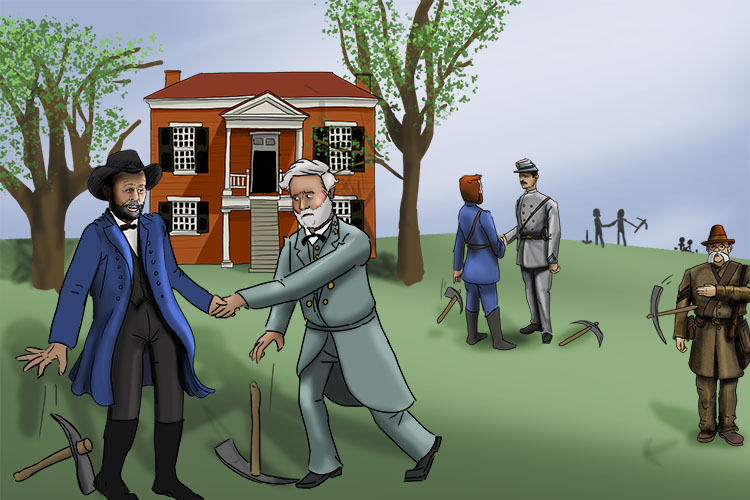Appomattox Court House – This was one of the last battles. Ulysses S. Grant accepted General Robert E. Lee's surrender
(Pronounced app-o-mat-ox)

All opposing sides put down their mattocks (Appomattox), which were used for digging in, and put down their weapons.
The Battle of Appomattox Courthouse was the last major battle of the American Civil War. It resulted in the surrender of the Commander of the Confederate Armies, General Robert E. Lee.
In the spring of 1865, after a number of battles and skirmishes had depleted and tired his army, Robert E. Lee and his troops were heading south through Virginia with the intention of meeting up with other Confederates in North Carolina.
However, Lee discovered that Ulysses S. Grant's Unionist army was marching parallel to him along the Appomattox River.
Lee changed direction and marched west instead, in search of urgently-needed supplies. Along the way there were a number of skirmishes with Union troops, which resulted in the Confederates losing numerous men and wagons. On April 8 1865, Lee's men paused their march a mile from the small village of Appomattox Court House, where the intention was to re-supply.
The next morning, Lee ordered his cavalry to attack Unionist troops who were blocking the road. Lee was commanding an army of nearly 27,000 men compared with Grant's 63,000.
The Confederates initially held the line and even managed to drive Union horsemen from their position on a ridge, but they ended up in a hopeless position with no means of escape.
Grant allowed Lee to choose a meeting place where they could discuss terms. The place chosen was the home of a retired man called Wilmer McLean. Lee agreed to Grant's terms and surrendered.
Interesting fact: Although Lee's surrender at Appomattox Court House effectively marked the end of the civil war, fighting continued for some considerable time. General Joseph E. Johnston's Army of Tennessee and smaller Confederate groups continued to fight throughout the deep south and to the west of the Mississippi. The war was not officially declared over until August 20, 1866.




